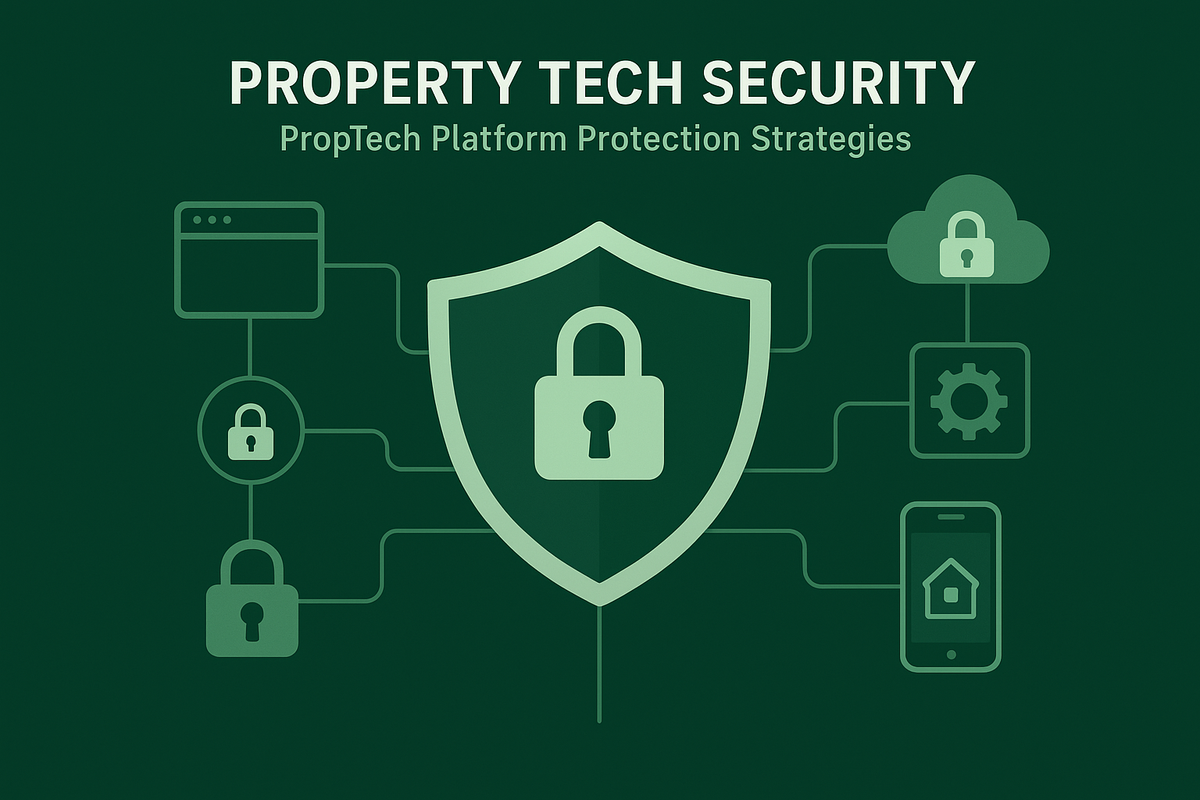Property Tech Security: PropTech Platform Protection Strategies

Introduction to PropTech Security
PropTech—property technology—covers platforms for smart building management, digital leasing, payment solutions, virtual tours, tenant communications, IoT-enabled access control, and data analytics. The influx of personal, financial, and operational data, combined with IoT integration, makes PropTech platforms alluring targets for cybercriminals. Successful security programs require proactive measures spanning technology, governance, compliance, and user awareness.
Key Cybersecurity Threats Facing PropTech Platforms
- Data breaches expose resident, tenant, and client PII, payment information, and property records, threatening privacy and compliance.
- Ransomware disrupts property operations, building access, payment portals, and tenant services, often causing financial and reputational damage.
- IoT vulnerabilities in devices such as smart locks and thermostats enable attackers to compromise building controls or pivot into core networks.
- Supply chain and third-party risks arise from vulnerabilities in vendor APIs, cloud integrations, or outsourced management systems.
- Insider threats—malicious or accidental actions by employees, contractors, or service providers—can lead to significant breaches.
- Social engineering attacks, such as phishing, seek to exploit the frequent high-value transactions and data exchanges in real estate.
- Distributed denial-of-service (DDoS) attacks may target tenant portals or platform APIs, impacting building functions or client access.
Security Challenges: Unique to PropTech
PropTech platforms must address security across cloud infrastructure, API integrations, legacy building systems, web and mobile apps, and an ever-expanding array of IoT devices. Common challenges include:
- Fragmented security controls due to diverse vendor ecosystems.
- Legacy devices susceptible to cyber attacks and difficult to patch.
- Regulatory complexity, with requirements including GDPR, CCPA, SOC 2, ISO/IEC 27001, and AML/KYC regulations for payments.
- Rapid scaling and remote work, leading to shadow IT and ungoverned access points.
Core Protection Strategies for PropTech Platforms
Secure Software Development and Platform Resilience
Use secure software development lifecycle (SDLC) methodologies—static code analysis, automated vulnerability scans, secure coding standards, and regular patching. Carefully vet all third-party libraries, SDKs, and APIs for vulnerabilities and license compliance.
Data Encryption and Robust Access Controls
Encrypt sensitive data at rest and in transit with strong protocols (e.g., TLS, AES-256). Implement fine-grained, role-based access controls (RBAC), enforce multi-factor authentication (MFA), and regularly audit credentials, especially for privileged users.
Cloud Security and Secure Integrations
Leverage cloud providers with strong compliance programs and robust SLAs (AWS, Azure, GCP). Monitor configuration of cloud storage buckets to avoid accidental exposure, enforce least privilege, and actively manage API and integration permissions.
IoT Device and Endpoint Security
Change default credentials for all smart devices and regularly update firmware. Segment IoT networks, monitor traffic for anomalies, and isolate vulnerable devices from critical operations.
Vulnerability Management and Security Audits
Conduct regular vulnerability scans, patch known issues quickly, and perform ongoing penetration testing of platforms and integrations. Use security audits to measure effectiveness and compliance, and remediate gaps proactively.
Security Awareness, Training, and Incident Preparedness
Train staff on cyber hygiene, phishing prevention, and data handling policies. Run simulated social engineering campaigns, and ensure employees know how to report incidents. Develop detailed incident response and business continuity plans including regular backups and red team/penetration exercises.
Regulatory Compliance and Legal Readiness
Automate data privacy compliance checks (GDPR, CCPA, AML/KYC) and maintain ready-to-audit records for authorities. Review contracts for security terms with vendors, and leverage cyber insurance for risk transfer.
Emerging Security Technologies and Trends
Modern PropTech security incorporates:
- AI-powered analytics for real-time threat detection and anomaly identification.
- System integration that unifies physical, digital, and IoT controls from a central hub, simplifying management while increasing resilience.
- Application security—including input validation, output encoding, and secure authentication—embedded during platform development.
- Privacy-by-design principles and minimization of data collection in all solutions.
Case Studies and Real-World Incidents
Include anonymized examples or high-profile breaches to spotlight lessons learned. For instance, cases of ransomware locking smart building systems, large-scale tenant data leaks, or attacks via third-party maintenance platforms can underscore the need for layered defenses and stakeholder coordination.
Future Directions and Industry Recommendations
- Continued advances in secure digital onboarding, biometric authentication, remote management, and AI-driven property analytics.
- Increasing regulatory pressure, with global harmonization of privacy, cybersecurity, and risk management frameworks for property-related data.
- Greater collaboration among PropTech vendors, property managers, and security specialists to create consistently resilient ecosystems.
Conclusion: Building Trust and Resilience with PropTech Security
The future of PropTech depends on robust, adaptive security strategies that protect both digital and physical assets, satisfy compliance demands, and earn user trust. Successful PropTech firms integrate security into platform architecture, invest in user and staff education, and continuously monitor for new threats while improving recovery plans—setting the standard for property technology resilience.
Take the Next Step with CodeSecure Solutions
Cyber threats are growing more sophisticated every day. With a trusted partner by your side, you can safeguard your business while focusing on what truly matters—growth and innovation.
At CodeSecure Solutions, we deliver comprehensive cybersecurity services in Chennai, uniquely tailored for startups, SMEs, and enterprises:
- Vulnerability Assessment & Penetration Testing (VAPT)
- Network Security Solutions
- Compliance Support (ISO 27001, PCI-DSS, HIPAA, DPDP Act, GDPR)
- Cloud & Endpoint Protection
- Security Awareness Training
No matter your industry or size, CodeSecure customizes solutions to fit your needs—ensuring your data, reputation, and operations remain secure.
Ready to Strengthen Your Defenses?
- 📞 Call: +91 73584 63582
- ✉️ Email: vapt@codesecure.in
- 🌐 Visit: www.codesecure.in
Stay secure. Stay informed. Choose CodeSecure Solutions—your partner in cyber resilience.
